 Yesterday, I had the opportunity to present the key findings from AQ6, the research study we collaborate on with Don Anthony’s Morning Show Boot Camp. We had a great online turnout, and I hope those of you in attendance share it with your staff, co-workers, and others in radio who might benefit from this information.
Yesterday, I had the opportunity to present the key findings from AQ6, the research study we collaborate on with Don Anthony’s Morning Show Boot Camp. We had a great online turnout, and I hope those of you in attendance share it with your staff, co-workers, and others in radio who might benefit from this information.
This year, I broke the results down a little differently – pulling out 9 key findings from the data I thought were of most interest and relevance. This year’s survey included 548 on-air personalities and producers who work for commercial radio stations. We also had a group of 59 radio pros who sadly find themselves out of work at this moment.
The first key finding I presented had to do with the percentage of women in the sample:
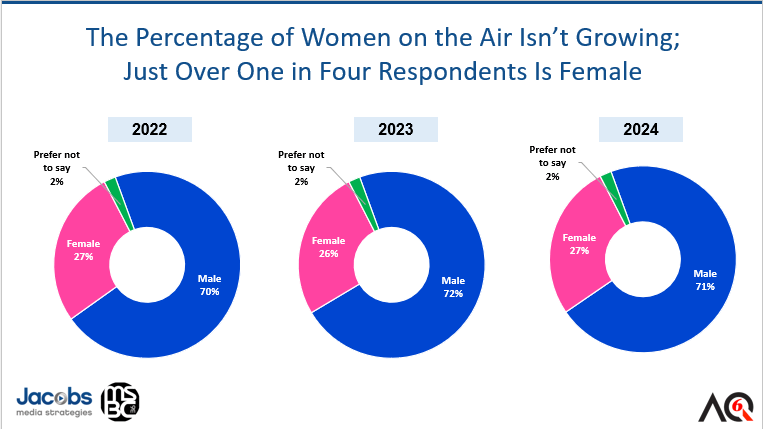
You don’t need my commentary to interpret this data point. In the last three years, the percentage of women on the air in our survey is stuck at about one in four respondents.
Today’s blog post is from September of 2019 as we wrapped up AQ2. In that study, the percentage of women behind the mic? Yup, one in four.
As you probably know, I’m a regular at Boot Camp where women are clearly more present than what we see in our quantitative studies. It’s a reminder that while there’s been progress made, we have a long way to go.
I hope you find this #TBT helpful, if not a bit ironic. It highlights some great broadcasters doing their best to affect change in the radio broadcasting industry. The point made back then is still relevant today – we need more female PDs who will be (more) openminded about hiring women for on-air work.
And here’s the bonus – when you hire females to program a radio station, chances are you’ll also benefit from much-needed youth. That’s because women behind the mic tend to be quite a bit younger than their male counterparts. Radio Ink’s Cameron Coats picked up on that in a strong piece, “Millennial and Gen Z Talent Bringing More Diversity To Radio.”
Of course, all this comes at a time when personalities are being eliminated in many markets by many companies. No one knows the actual numbers, but it’s a very safe assumption there are many fewer talent positions in commercial radio in the U.S. than there were five years ago when I wrote this post.
On the surface, that may be discouraging, but it shouldn’t stop some of the organizations and activists listed in this post as well as the many others who have come along since this was first published. As we’ve seen from other corners of the job force and even our political environment, change is in the air. Hopefully, radio can benefit from the trend. – FJ
September 2019
I was hanging out with my friend, Haley Jones, at a conference a few weeks back. In this phase of her career, Haley is an accomplished exec at Nielsen Music – their Director | Music – helping the media community understand the impact of music and radio on audiences, as well as on each other.
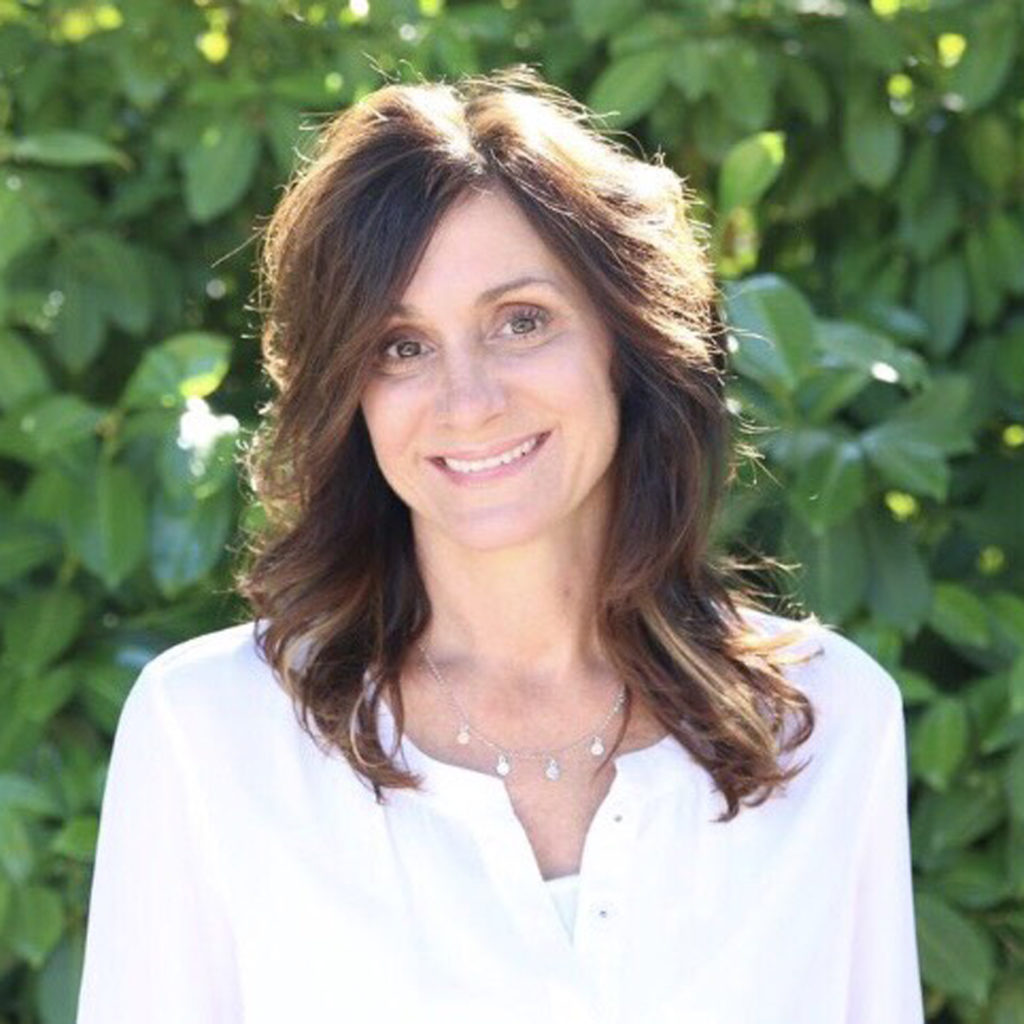 But before Haley took on this role a few years back, she was an accomplished program director, working in the Triple A/Rock family in markets that include San Francisco, San Diego, and Austin. These days, she’s seeing the world from a fascinating perspective through analytics, but her heart still lies in the radio business.
But before Haley took on this role a few years back, she was an accomplished program director, working in the Triple A/Rock family in markets that include San Francisco, San Diego, and Austin. These days, she’s seeing the world from a fascinating perspective through analytics, but her heart still lies in the radio business.
We got to talking about improving roles for women in radio. Females are well-represented in sales, of course, and are increasingly running the show out of their corner offices in companies that include Hubbard, Beasley, Cumulus, NRG, Cox, and others.
But behind the mic, progress is still too slow, but becoming more apparent with each passing year. Our new AQ2 study of radio talent reveals that only one in four radio personalities are women.
But as Haley reminded me, female programmers are still very few and far between – 11% overall – the same as it’s been the past dozen years. “It’s always been a boy’s network,” she asserted. And she’s right.
Even at radio’s best companies where women have made impressive strides, PDs are still mostly male. And we are very likely in that zone where many perceptive and realistic women in radio have concluded the pathway to programming may not be worth the hassle or the struggle, given historical trends suggesting they’ll not have much of a shot.
So, that means it’s on those of us in positions that can get things done to reassess and rethink why this is – and what can be done to address it. And because there may be fewer and fewer women who now strive to wear P.D. stripes, that means active mentorship is the way to go.
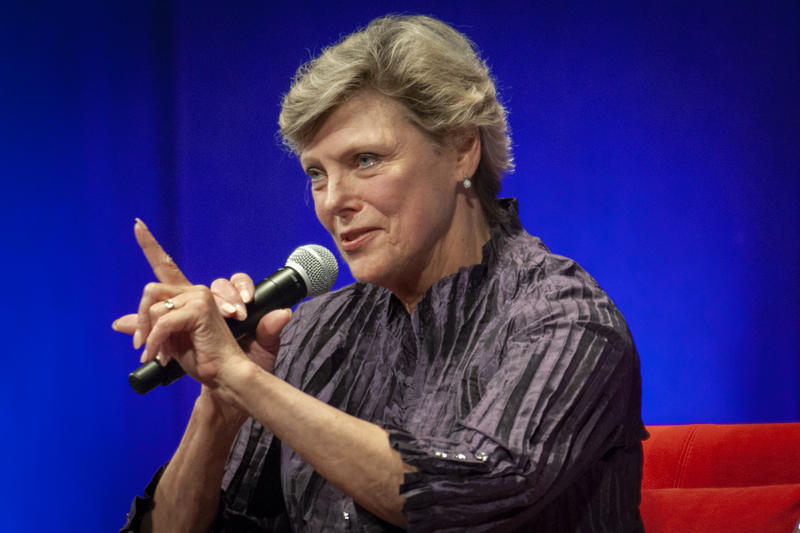
I was reminded of the value of mentoring last week when I heard the news of Cokie Roberts’ passing. If you’re “into” news, politics, or public radio, you know her backstory. Cokie came from political royalty – her parents both served in Congress – but she took a journalistic path, eventually ending up at the ground floor of National Public Radio and later, ABC News.
Along with her sidekicks, Nina Totenberg, Linda Wertheimer, and Susan Stamberg, Roberts became known as one of the “Founding Mothers of Public Radio,” opening the door to women starting way back in the 1970s. In the many eulogies and remembrances that have flowed over the past several days, Cokie Roberts’ mentorship of women, in particular, as been much discussed and lauded. In a recent tribute, Nina Totenberg wrote the following about Roberts:
“And of course, she was the voice of women. She understood injustices large and small. She understood the hurdles that blue- pink- and white-collar women face — in raising and providing for a family, in dealing with husbands and bosses. She understood the whole balance of life.”
And mentoring women in journalism was a focal point.
So, here we are in 2019, at a time when broadcast radio could use more than a few good women at the PD desk. Haley told me about an initiative 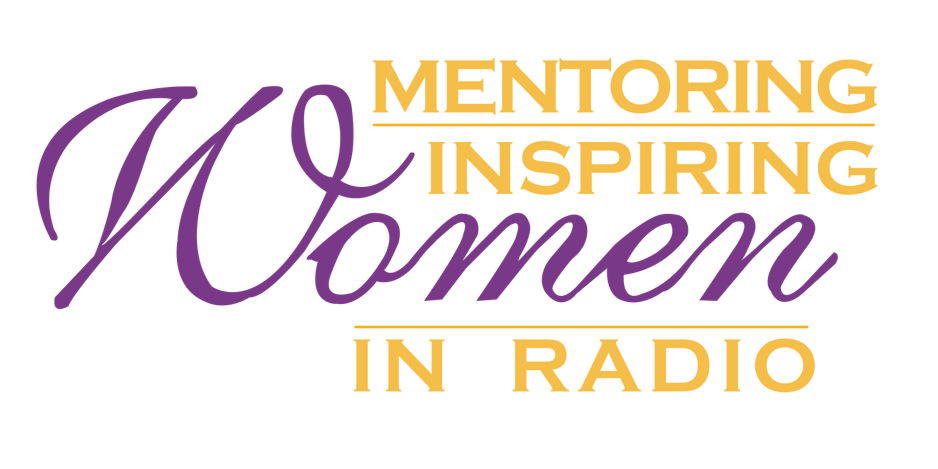 MIW (Mentoring and Inspiring Women In Radio) has launched to mentor aspiring program and music directors.
MIW (Mentoring and Inspiring Women In Radio) has launched to mentor aspiring program and music directors.
Sadly, the deadline has passed for this year’s program. But its mere existence is evidence of proactivity that should inspire other industry organizations whose focus in on growing the next generation of radio pros.
I’ve had involvement – formal and informal – in Conclave, the National Radio Talent System, and Public Radio Program Directors – all groups with great leadership and big goals. Perhaps there’s a collaborative process, along with MIW, of course, to scale these efforts, expanding mentorship.
But a recent story in the Harvard Business Review – “What Men can do to Be Better Mentors and Sponsors to Women” – outlines the ways that men can make a real contribution to helping women get ahead.
Rania Anderson and David Smith say that mentoring is a contribution men can make to women in the workplace. But it is advocating for them that is the difference-maker.
It starts with identifying potential programming talent, even if the woman in question has no hands-on experience as a music director or APD.

The authors suggest putting women in “stretch roles” – high profile opportunities (like a station concert, festival, or other big event) that can show off their talents. They note the best of these “stretch roles” involve risk, profit or loss, client interaction, and other elements that provide a true test of performance for the station.
Of course, success depends on connecting the female protégé with mentoring help, time, and financial resources to help them gain the necessary skills.
A key conclusion?
“There are plenty of men who want to do what’s best for their businesses and employees. We find that sponsorship and advocacy make the biggest difference.”
While mentoring can be effective, it is also about going to bat for women, especially in organizations where women PDs are a rarity – or non-existent.
That means mentors using their influence – in a public and visible way. As Anderson and Smith point out:
“We regularly see mentors who support their mentees privately but are reluctant to advocate for them.”
That resonated for me – as it might for other men in power positions. Giving our time is one thing – using our pull to help a woman get that shot is another.
We keep talking in radio about new content creation, and the ongoing need to develop new programming, new formats, and new innovations. Perhaps part of the problem is that it’s the same old guys at the helm – as programmers, operations directors, and yes, consultants.
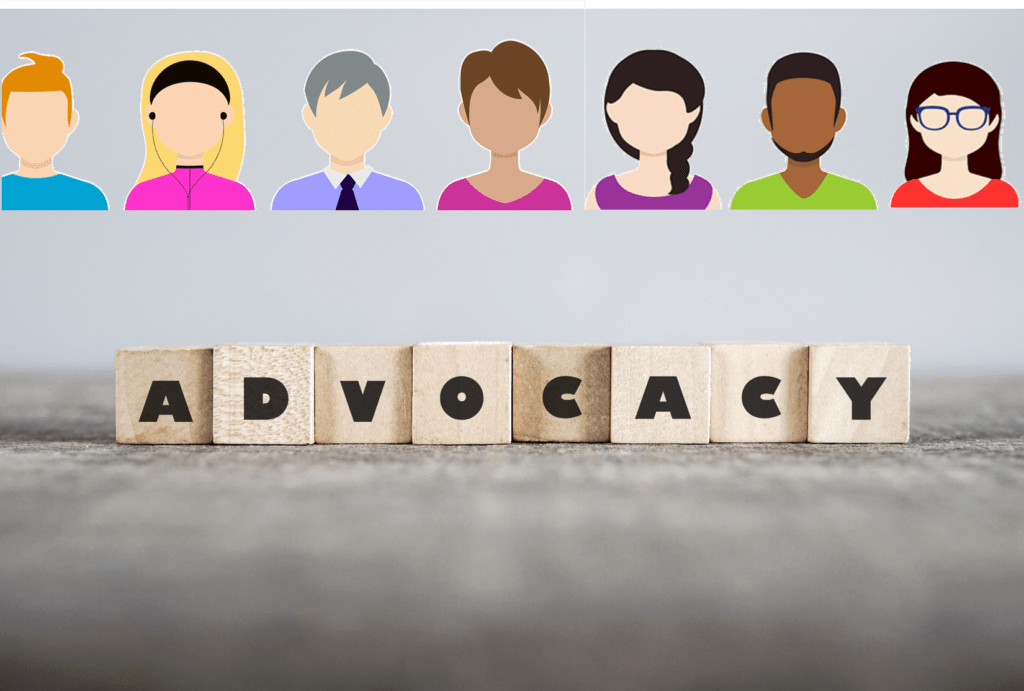
I’m in. I’m happy to work together with any – or all – of the aforementioned groups to facilitate change.
Yes, mentoring is good.
Advocacy? Better.
Congrats to Christine Travaglini, president of Katz Radio Group, on her 2019 MIW Trailblazer Award, and to the Kidd Kraddick Show’s Kellie Rasberry on her 2019 MIW Airblazer Award.
- “My Favorite Decade Of Music Is The __’s” - June 5, 2025
- Who’s Got It Better? Talent In Commercial Radio vs. Talent in Christian Music Radio - June 4, 2025
- It’s The Christian (Radio) Thing To Do - June 3, 2025





Hooray for the Great Women in Broadcasting.
Hooray indeed, Clark!
Fred, now that I am old….or should we say vintage, I can remember the stunning news when Ruth Meyer was named the first female PD of WMCA in New York! This was back in the 1960’s when Fabulous 57 wmca was “The Home of the Good Guys” competing with 77 WABC and everybody in radio was male. How times have changed. My first radio station video profile in 1979 was at AM top 40 13/WIFE in Indianapolis and they had a female PM drive DJ by the name of Diane Shannon. Unheard of back then…and she was damn good! In fact today she is a successful sales manager for MacDonald Broadcasters up in Traverse City, Michigan. Women can do it all. Can they run the country? Who knows?
As we are so fond of saying, Art, “stay tuned.” Thanks for the comment.
Hi Fred, thanks for shining a light on this topic again. For the record, the study you mentioned about female Program Directors only being 11% of the total PD population remains at that same percentage 5 years later, based on this year’s study from MIW. I can’t help but think what the industry would look like if we were to get that percentage to even 20%. Thanks for all you do!
I was afraid of that, but not surprising given our air talent numbers in AQ6. Leslie, would love to hear your fingerprints all over a great radio station soon.
Thanks so much for shining a light on this topic! As a female APD (and future PD hopefully) this makes me feel even more motivated in my role to mentor other women in radio. Also, I find the timing of this really interesting given the fact that a station just launched here in Seattle (Emma 94.1) and programmed by…a man. Disappointing to me but also an interesting commentary with this article releasing at the same time…we can do so much better!
Indeed we can. Thanks for chiming in on this one, Harmony.
Here’s a thought…..and stick with me here…..but could it be that women in general don’t WANT to be PDs?
I believe everyone who wants a chance should get it, but what if it’s like the oil execs who said “we need more women working on our oil rigs”. But the problem was, women don’t want to work on oil rigs.
Also, with all this massive consolidation there are fewer PDs now. It used to be each station in a market had one. Now there is one PD maintaining an entire format across the whole company.
The lack of jobs, coupled by the lack of women desiring to do that job means there are fewer women in those positions.
Just a thought.